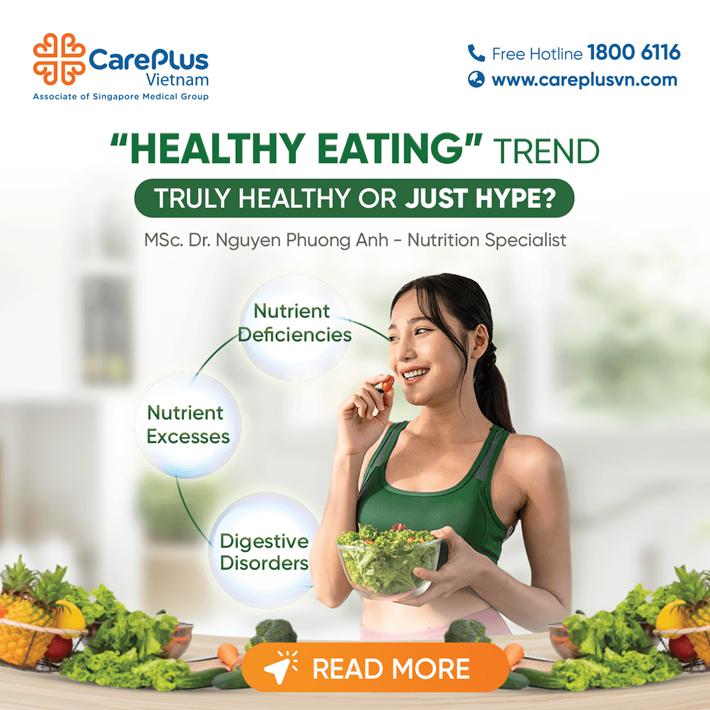“HEALTHY EATING” TRENDS: TRULY HEALTHY OR JUST HYPE?
Popular online eating trends like “eat clean,” cutting out carbs, or sticking to oats with yogurt and seeds—are they actually good for your health? Let’s find out with a CarePlus doctor in the article below.

6/4/2025 4:32:43 PM
🥗 You stick to oats, chicken breast, and greens. You cut out sugar, minimize carbs, and crave salad every day… That’s a commendable effort! But in many cases, despite “eat clean”, people still experience low energy, dull skin, and digestive discomfort. The issue might stem from improper dietary habits—leading to nutrient deficiencies, excesses, or imbalances that impact overall health.
👉 Join MSc. Dr. Nguyen Phuong Anh - Nutrition Specialist at CarePlus International Clinics, to explore what a truly healthy diet entails—and why blindly following food trends might not be as healthy as you think.
1️⃣ What Is a Truly Healthy Diet?
Don’t label a meal “healthy” just because it’s low in sugar, low in carbs, high in greens, or includes some expensive “superfood.” A genuinely healthy diet must meet the following four key principles:
✅ Adequate Energy Intake to Maintain a Healthy Weight
A healthy weight is typically defined by a Body Mass Index (BMI) between 18.5–23 kg/m². Undereating and failing to meet daily energy needs can result in weight loss and malnutrition. On the other hand, overeating leads to energy surplus, which is stored as fat—raising the risk of overweight and obesity.
👉 Both malnutrition and obesity are forms of nutritional imbalance and are associated with serious health risks including impaired immunity, hormonal disorders, cardiovascular disease, diabetes, and osteoporosis.
That’s why the first criterion for a healthy diet is providing sufficient energy to help your body maintain a stable and appropriate weight over time.
✅ Balanced Food Groups
🌟 Every day, your body needs all six essential food groups:
Grains (rice, noodles, bread, tubers...), Protein sources (meat, fish, eggs, legumes), Vegetables, Fruits, Fats and oils, Dairy and dairy products. Each group plays an irreplaceable role. For example, a salad with grilled chicken or salmon may sound healthy—but if it lacks grains, your body may not get enough carbohydrates (the primary fuel for the brain and muscles) or B vitamins, which are abundant in whole grains.
A well-balanced diet includes all food groups—not just a few “trendy” ones.
✅ Variety Within Each Group
Even foods in the same group vary in nutrient composition. No single item provides every essential nutrient. For instance: Broccoli is rich in folate and sulforaphane (a powerful antioxidant), but low in lycopene, a compound abundant in tomatoes that’s great for your heart and skin.
To nourish your body fully, diversify your meals: rotate vegetables, mix up proteins (meat, fish, eggs, tofu), and vary starches (rice, sweet potatoes, corn, oats…).
✅ Healthier Choices Within Each Group
It’s not just about eating from the right groups—you also need to choose the healthiest options within each category:
👉 Recommended choices:
▪️ Whole grains instead of refined carbs
▪️ Healthy fats from oily fish, seeds, and plant-based oils
▪️ Whole fruits and vegetables—limit juices and canned goods
▪️ Lean proteins—limit processed meats
▪️ Low-fat or unsweetened milk if you need to manage calories
These small, daily choices can have a big long-term impact on your health.
2️⃣ The Risks of Eating with the Trend: Deficiencies, Excesses & Digestive Disturbances
⚠️ Social media-driven “clean eating” trends—like only eating salads and fruit, eliminating carbs, following extreme vegan diets, or having oats with yogurt and seeds at every meal—can pose real health risks:
❌ Deficiency from cutting out entire food groups
❌ Excess from overloading on one group (e.g., too much fiber or protein)
❌ Metabolic disruption caused by an unbalanced diet, forcing your body to adapt in potentially harmful ways
👉 In short: A truly healthy diet must be balanced, varied, adequate, and well-informed—not just “low sugar – low carb – lots of greens.”
3️⃣ Are You Eating Right for Your Body?
Each person’s nutritional needs vary—depending on age, gender, activity level, and existing health conditions. That’s why the key isn’t to follow trends blindly, but to understand the principles of healthy eating and apply them suitably to your local foods, cultural habits, and personal budget.
CarePlus is here to support you in developing a healthy and personalized eating plan through our comprehensive Nutrition Screening Package, thoughtfully designed to provide an accurate assessment of your overall health. This package includes:
✅ Anthropometric assessment
✅ 24-hour dietary recall and evaluation
✅ Clinical examination
✅ Essential laboratory tests and imaging diagnostics
✅ Personalized nutrition counseling
👉 Please contact us at free hotline 1800 6116 to book your appointment today!
CAREPLUS INTERNATIONAL CLINICS
Associate of Singapore Medical Group
Hotline: 1800 6116
Email: info@careplusvn.com
Fanpage: CarePlus Clinic Vietnam